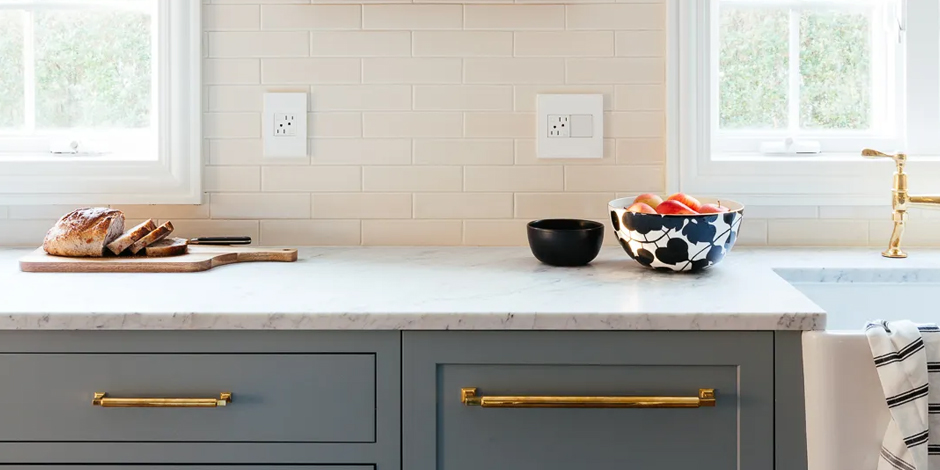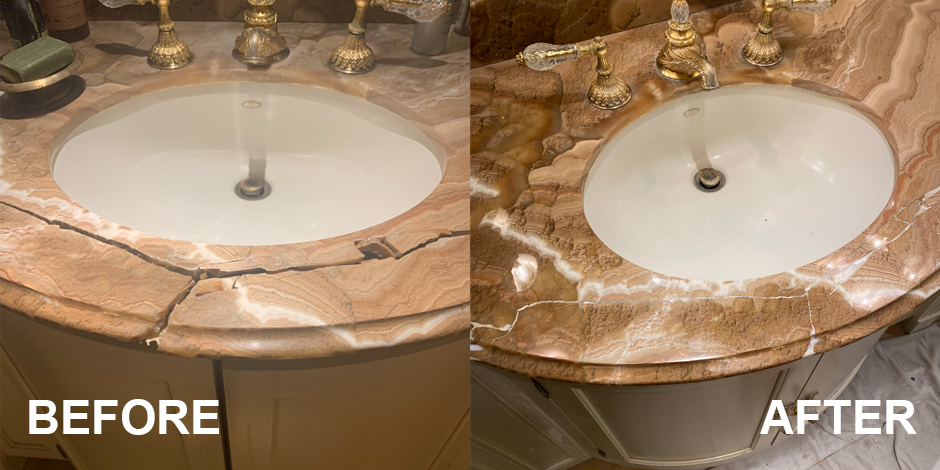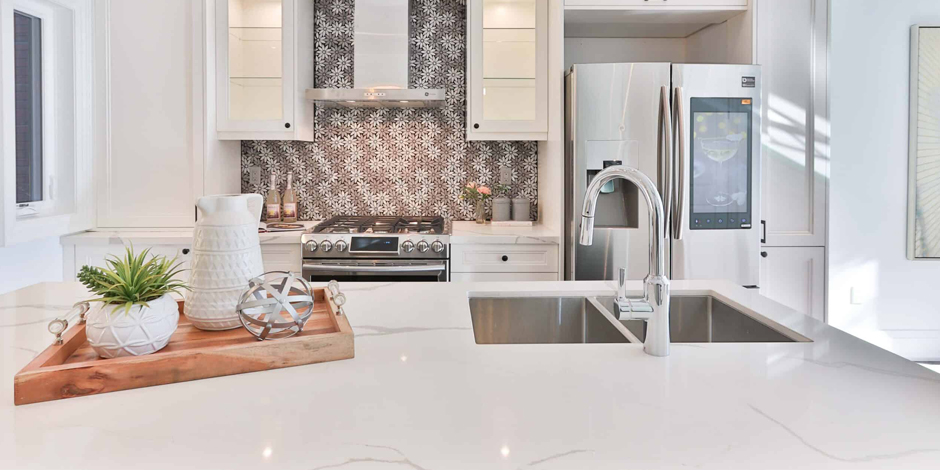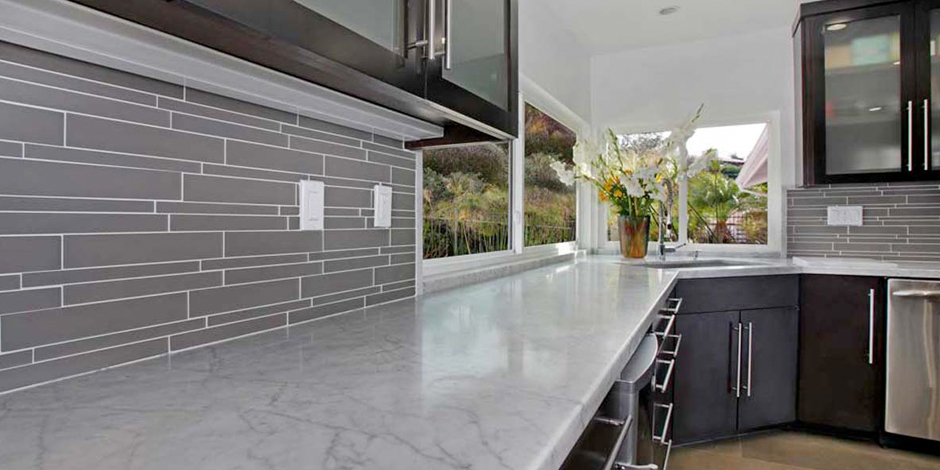
Choosing the Right Cleaning Products for Marble Countertops Care in Montgomery County
In Montgomery County, marble worktops are a popular option for kitchens and baths because they radiate elegance. For homeowners, they are a highly valued investment because to their classic elegance and innate charm. Nonetheless, choosing the appropriate cleaning supplies is crucial to maintaining the durability and gloss of your marble worktops. Tri State Marble Countertop Care is here to help you choose the best cleaning solutions for your Marble Countertops Care in Montgomery County because we are professionals in the field.
Understanding Marble’s Vulnerabilities
Understanding the special qualities of marble is essential before diving into cleaning product recommendations. Because marble is a naturally occurring stone mostly made of calcium carbonate, it is susceptible to abrasion, etching, and discoloration. Its sensitive surface could therefore sustain irreversible harm if the incorrect cleaning chemicals are used.
Cleaning Products to Avoid
- Acidic Cleaners: Marble countertops should not be cleaned with any acidic cleaners, such as vinegar or lemon juice. These may react with marble’s calcium carbonate, causing dullness and etching.
- Abrasive Cleaners: Avoid using scouring pads or other abrasive cleaning supplies. These have the potential to scuff your marble’s surface, reducing its original luster and beauty.
- Bleach and Ammonia: Marble should never be cleaned with bleach or ammonia-based solutions. The stone may get damaged and discolored by these harsh chemicals.
- Harsh Chemicals: Steer clear of any cleaning supplies that include strong acids, solvents, or harsh chemicals. Your marble countertops‘ protective sealant may be harmed by them.
Choosing the Right Cleaning Products
After discussing the things to avoid, let’s concentrate on the safe and efficient cleaning solutions for preserving your marble countertops in Montgomery County.

- pH-Neutral Cleaners: Non-abrasive, pH-neutral cleaners are the ideal cleaning supplies for marble countertops. These cleaners efficiently remove dirt and grime from stone while being kind to the stone. Seek out specialist marble cleaners or make sure the product is close to neutral (pH 7), by reading the pH level on the package.
- Microfiber Cloths: To clean your marble countertops, make an investment in premium microfiber cloths. These lint-free, soft cloths are perfect for cleaning surfaces without causing any scratches or harm to the stone.
- Distilled Water: Distilled water is a great option for regular cleaning. It guarantees that your marble will stay immaculate by not leaving behind mineral deposits.
- Mild Dish Soap: To clean marble countertops, a warm water solution with a few drops of mild dish soap works well in many situations. To avoid leaving behind water stains, make sure you rinse well and pat dry the surface.
- Natural Stone Cleaners: There are a number of professional natural stone cleaners on the market that are made especially for stone surfaces like marble. The purpose of these products is to clean without damaging the integrity of the stone.
- Marble-Specific Cleaners: Use cleansers that are specially designated for marble surfaces for an extra layer of peace of mind. The inherent beauty of the stone is preserved while safe and efficient cleaning is provided by these products.
- Marble Polishing Powder: You can use marble polishing powder to bring back the luster in situations when there is just slight etching or dullness. Pay close attention to the manufacturer’s directions.
The Cleaning Process
Here’s how to clean your marble countertops in Montgomery County step-by-step, now that you have the proper cleaning supplies on hand:
- Use a dry, soft cloth to lightly sweep or wipe the surface to remove any loose dirt or debris.
- As directed by the product, combine a small amount of your preferred pH-neutral cleaner with warm water.
- Wipe off the countertop with a microfiber cloth or sponge dipped in the cleaning solution. Observe any spills or stains closely.
- To get rid of any residue, give the surface a thorough rinse with clean water.
- To avoid water stains, wipe the countertop down with a fresh, dry towel.
Making the best cleaning solution choices and adhering to recommended cleaning methods are essential to preserving the beauty of your marble countertops in Montgomery County. Choose pH-neutral, non-abrasive cleaning solutions instead of harsh, acidic, or abrasive ones. For many years to come, your marble countertops will add classic beauty to your house when you use the proper cleaning supplies and follow a regular cleaning schedule.
You can rely on Tri State Marble Countertop Care for expert marble countertop care and maintenance services in Montgomery County. Your marble surfaces will always be gorgeous and immaculate thanks to our experience. For any of your marble countertop maintenance needs, contact us right now.
Sealing Marble Countertops in Montgomery County: When, Why, and How - Tri State Marble Countertop Care
Marble countertops are a popular choice among homeowners in Montgomery County, Pennsylvania, because of its natural elegance and timeless beauty. However, appropriate maintenance is essential to maintain the gorgeous appearance and safeguard your investment. Sealing is a crucial part of maintaining a marble countertop. With advice from the professionals at Tri State Marble Countertop Care, we will examine in this post the why, when, and methods for sealing marble countertops in Montgomery County.
When to Seal Marble Countertops
The type of marble, where it is located, and how much wear it receives all affect how often you seal your marble countertops. Generally speaking:
- Newly Installed Countertops: Marble countertops that were recently placed were probably sealed prior to installation. It’s still a good idea to have your installer verify this, though. After a few months, you might want to reseal them to provide continued protection.
- Light-Colored Marble: Countertops made of light-colored marble, like white Carrara or Calacatta, would need to be sealed more frequently than those made of darker marble. Marbles with lighter hues are typically more porous and stain-prone.
- High-Traffic Areas: It is recommended to seal marble countertops every six to twelve months in kitchens because they are regularly exposed to food, liquids, and probable spills.
- Low-Traffic Areas: Sealing marble worktops in restrooms or other places with little foot traffic may be sufficient every 12 to 18 months.
- The Water Test: If you’re not sure whether to protect your marble countertops, you can do a quick water test. Drops of water should be scattered around the surface. You still have appropriate sealing on your countertops if the water beads up instead of seeping into the marble. It’s time to reseal if the water seeps through and leaves a dark area.

Why Seal Marble Countertops
An essential part of marble countertop care and upkeep is sealing. This is the reason it’s crucial:
- Stain Prevention: Marble is a porous stone, meaning that liquids can absorb into it and cause stains. By preventing spills and liquids from seeping through the surface, sealing lowers the possibility of discoloration.
- Enhanced Durability: Sealing fortifies the stone’s surface, increasing its capacity to withstand wear and tear from regular use. It assists in preventing etching and scratches brought on by acidic materials.
- Longevity: Marble countertops that are routinely sealed have a longer lifespan and retain their beauty and value for many years to come.
How to Seal Marble Countertops
When done correctly, sealing your marble countertops in Montgomery County is a simple process. Here’s a detailed how-to:
- Clean Thoroughly: Make sure the counters are spotless and free of any residue, debris, or grime before sealing. Use water and mild dish soap or a pH-neutral cleanser. After giving the area a thorough rinse, let it dry entirely.
- Choose the Right Sealer: Go for a premium, penetrating sealer made especially for marble or other natural stone. If you are sealing kitchen countertops, you must use a product that is safe for places that come into touch with food.
- Test in a Small Area: To guarantee compatibility and get the desired outcome, try the sealer in a small sample piece of marble or in an unnoticeable region before applying it to the entire surface.
- Apply the Sealer: Use the sealer according to the manufacturer’s directions. Usually, you’ll use a clean, lint-free cloth, brush, or sponge to apply the sealer evenly. Let it sit for the suggested amount of time.
- Wipe Off Excess: Use a clean, dry cloth to remove any excess sealer that remains after the allotted dwell time. To prevent residue or stains, be meticulous.
- Allow to Cure: According to the sealer’s directions, give the sealed surfaces time to cure. It’s critical to maintain the surface dry and steer clear of spills and moisture throughout this time.
- Test for Effectiveness: Use the previously described water test to make sure the sealer has been applied correctly.
In order to keep Montgomery County marble countertops free from wear, damage, and stains over time, sealing is a crucial component of their upkeep. You can make sure your marble countertops maintain their inherent beauty and elegance for many years to come by knowing when to seal, why it’s important, and how to do it properly.
Trust Tri State Marble Countertop Care‘s experience for skilled marble countertop maintenance and sealing services in Montgomery County. To make sure your marble countertops get the maintenance they need, get in touch with us right now.
Maintaining Marble Countertops in Montgomery County - Expert Tips from Tri State Marble Countertop Care
Marble countertops are a popular choice among homeowners in Montgomery County, Pennsylvania, due to its timeless beauty and elegance. However, regular care is necessary to guarantee that your marble countertops stay shiny and maintain their immaculate appearance. We’ll provide professional advice on how to properly maintain your marble countertops in Montgomery County in this post, courtesy of Tri State Marble Countertop Care.
-
Daily Cleaning Routine
A daily cleaning schedule is the cornerstone of caring for marble countertops. Here’s an efficient way to accomplish it:
- After using the countertops, wipe them down with a soft, moist cloth or sponge.
- Select a non-abrasive cleanser with a pH of neutral. Steer clear of acidic cleaners, vinegar, and strong chemicals as they can etch the marble and reduce its luster.
- To avoid water stains, completely dry the counters with a fresh, gentle towel.
-
Regular Sealing
To keep your marble countertops free of stains and damage, sealing is essential. Marble is prone to spillage and can absorb liquids due to its porous nature. What you need know about sealing is as follows:
- Apply marble sealer according to manufacturer’s recommendations using a premium product.
- Marble countertops usually require sealing every six to twelve months. But the frequency could change according on the kind of stone and how it’s used.
-
Handling Spills Promptly
In a busy kitchen, spills and accidents happen frequently. It’s critical to clean up spilled liquids like wine, juice, or oil on your marble surfaces right away:
- To stop the spill from spreading, mop it up with a fresh, gentle towel.
- Use a pH-neutral cleaner to clean the surface to avoid etching or discoloration.
-
Using Cutting Boards and Trivets
Marble scratches readily because it is softer than certain other materials used for countertops. To avoid scuffs and damage:
- While chopping or preparing food, always utilize cutting boards.
- To prevent heat-related damage to your marble, use hot pads or trivets beneath hot cookware.

-
Avoiding Abrasive Cleaners and Tools
Marble surfaces should never be cleaned with abrasive cleaners, scrub brushes, or scouring pads. These can cause surface scratches and sealant damage, making your counters more susceptible to etching and stains.
-
Establish a Regular Cleaning Routine
The maintenance of marble countertops requires consistency. This is a suggested cleaning schedule:
- Use a moist towel to wipe clean your countertops after each use.
- At least once every week, conduct a thorough cleaning.
- For further cleaning, use a pH-neutral or cleaner designed specifically for marble.
-
Addressing Etching and Stains
Over time, etching or stains may appear on your marble countertops even with your best efforts. When acidic materials come into touch with the marble surface, etching happens. For light engraving:
- If you want to bring back the sheen, you might try utilizing marble polishing powder.
- It is essential to seek the advice of experts like Tri State Marble Countertop Care for restoration services if there are major stains or damage.
-
Professional Restoration and Polishing
Your marble countertops might need to be professionally restored and polished from time to time:
- The surface is sharpened to get rid of scratches, stains, and etchings.
- The marble is polished to bring back its original sheen after honing.
- Tri State Marble Countertop Care provides the know-how and tools necessary to carry out these treatments efficiently and restore the aesthetic appeal of your countertops.
-
Preventing Water Damage
Keep an eye out for water damage, particularly near faucets and sinks:
- Make sure the underside of the sink is adequately sealed to stop water seeping in.
- Check for leaks frequently, and fix them right once to avoid long-term damage.
Adding marble countertops to your Montgomery County house is a choice that will give your living area a timeless elegance. It’s essential to adhere to recommended care and maintenance procedures if you want to safeguard your investment and keep your countertops looking brand new.
For marble countertop restoration and upkeep, Tri State Marble Countertop Care is your go-to resource. For many generations to come, you can continue to appreciate the timeless elegance of your marble surfaces because to our experience, attention to detail, and commitment to maintaining the beauty of your counters.

0 comments